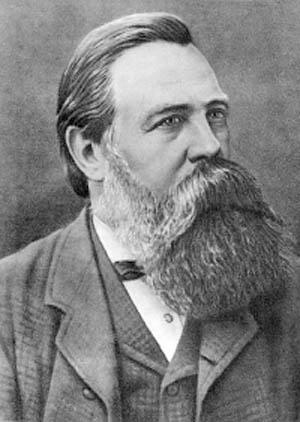Origine: Da Anti-Dühring.
Friedrich Engels frasi celebri
Origine: Dalla prefazione al III libro de Il Capitale, 4 ottobre 1894.
Origine: Da Bozza della confessione di fede di un comunista http://www.marxists.org/archive/marx/works/1847/06/09.htm, 1847.
Origine: Citato in Corriere della Sera, 25 settembre 2009.
Origine: Citato in Nicholl 1956.
Frasi sul viaggio di Friedrich Engels
Origine: Da Karl Marx, Friedrich Engels, Opere complete, Editori Riuniti, vol. XVII, pp. 375-376, 1860.
Origine: Parte avuta dal lavoro nel processo di umanizzazione della scimmia, pp. 399-400
Origine: Parte avuta dal lavoro nel processo di umanizzazione della scimmia, p. 399
Friedrich Engels Frasi e Citazioni
Origine: Da Dialettica della natura; citato in Nicholl 1956.
Origine: Parte avuta dal lavoro nel processo di umanizzazione della scimmia, p. 407
“Ci si domandava: Che cosa è Dio? E la filosofia tedesca ha risposto: è l'uomo.”
Origine: Citato in Roger Garaudy, Karl Marx (Clefs pour Karl Marx), traduzione di Marilena Feldbauer, Universale Sonzogno, 1974.
Origine: Da The German Ideology; citato in Nicholl 1956.
Origine: Parte avuta dal lavoro nel processo di umanizzazione della scimmia, pp. 401-402
“Lodi è l'unico pied-à-terre del socialismo in Italia.”
Origine: Citato in Roberto Michels, Storia critica del movimento socialista italiano: dagli inizi fino al 1911, p. 44.
Origine: Parte avuta dal lavoro nel processo di umanizzazione della scimmia, p. 400
Origine: Parte avuta dal lavoro nel processo di umanizzazione della scimmia, p. 403
Origine: Da La situazione della classe operaia in Inghilterra
Origine: Citato in Edward H. Carr, Sei lezioni sulla storia, a cura di R. W. Davies, traduzione di Carlo Ginzburg, Einaudi, 2016, p. 88.
Origine: Da La guerra dei contadini in Germania, in K. Marx e F. Engels, Opere complete, Editori Riuniti, Roma, 1970, vol. X, p. 428; citato in Luigi Fenizi, Icaro è caduto [Parabola storica dell'utopia moderna], Bardi Editore, Roma, 2003, pp. 6-7.
Friedrich Engels: Frasi in inglese
Letter to Conrad Schmidt http://www.marxists.org/archive/marx/works/1890/letters/90_08_05.htm (August 5, 1890)
The Communist Manifesto, footnote (1888 edition)
Anti-Dühring http://www.marxists.org/archive/marx/works/subject/quotes/index.htm (1878)
Diese aus dem gegenseitigen Neid und der Habgier der Kaufleute entstandene Nationalökonomie oder Bereicherungswissenschaft trägt das Gepräge der ekelhaftesten Selbstsucht auf der Stirne.
Outlines of a Critique of Political Economy (1844)
The Origin of the Family, Private Property and the State (1804) as translated by Ernest Untermann (1902); Full English text of The Origin of the Family, Private Property and the State http://www.marxists.org/archive/marx/works/1884/origin-family/index.htm - Full original-language German text of The Origin of the Family, Private Property and the State http://www.mlwerke.de/me/me21/me21_025.htm
(1847)
Die Nationalökonomie entstand als eine natürliche Folge der Ausdehnung des Handels, und mit ihr trat an die Stelle des einfachen, unwissenschaftlichen Schachers ein ausgebildetes System des erlaubten Betrugs, eine komplette Bereicherungswissenschaft.
Outlines of a Critique of Political Economy (1844)
Origine: (1845), p. 275
Ihr habt ... die Kriege vermindert, um im Frieden desto mehr zu verdienen, um die Feindschaft der einzelnen, den ehrlosen Krieg der Konkurrenz, auf die höchste Spitze zu treiben!
Wo habt ihr etwas aus reiner Humanität, aus dem Bewußtsein der Nichtigkeit des Gegensatzes zwischen dem allgemeinen und individuellen Interesse getan? Wo seid ihr sittlich gewesen, ohne interessiert zu sein, ohne unsittliche, egoistische Motive im Hintergrund zu hegen?
Outlines of a Critique of Political Economy (1844)
(1847)
Introduction to 1891 edition of Karl Marx's, The Civil War in France
(1847)
(1847)
Origine: The Condition of the Working Class in England in 1844 (1845), p. 27
Die Nachfrage des Ökonomen ist nicht die wirkliche Nachfrage, seine Konsumtion ist eine künstliche. Dem Ökonomen ist nur der ein wirklich Fragender, ein wirklicher Konsument, der für das, was er empfängt, ein Äquivalent zu bieten hat.
Outlines of a Critique of Political Economy (1844)
Anti-Dühring http://www.marxists.org/archive/marx/works/subject/quotes/index.htm (1878)
Letter to Philipp Van Patten http://www.marxists.org/archive/marx/works/1883/letters/83_04_18.htm (18 April 1883)
Introduction (1895) https://www.marxists.org/archive/marx/works/1850/class-struggles-france/intro.htm to Marx's The Class Struggles in France (1848-50)
Letter https://marxists.catbull.com/archive/marx/works/1851/letters/51_05_23.htm to Karl Marx (23 May 1851)
